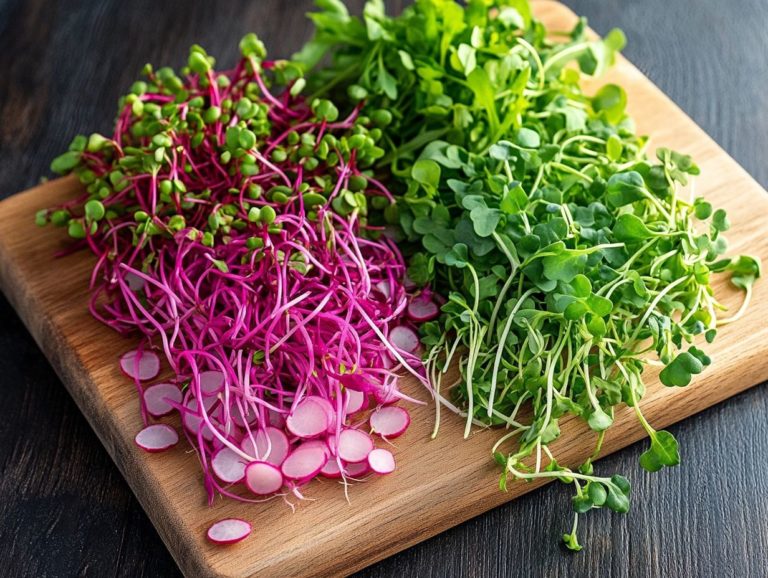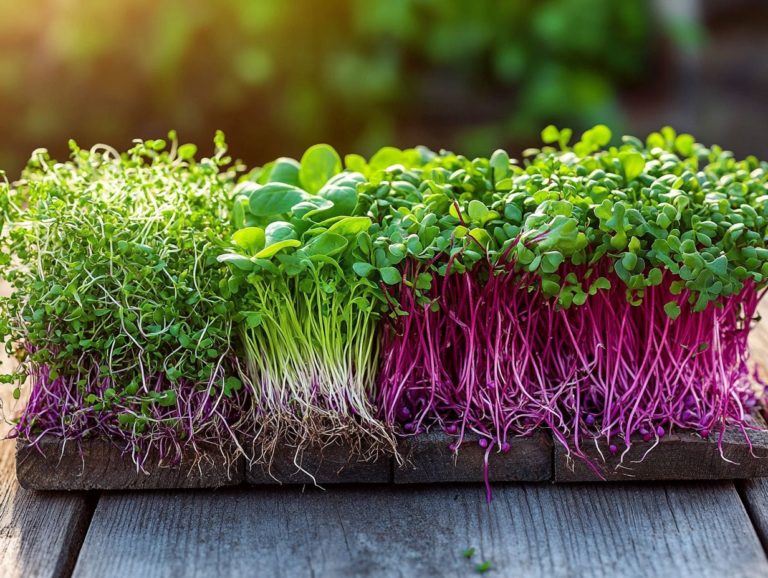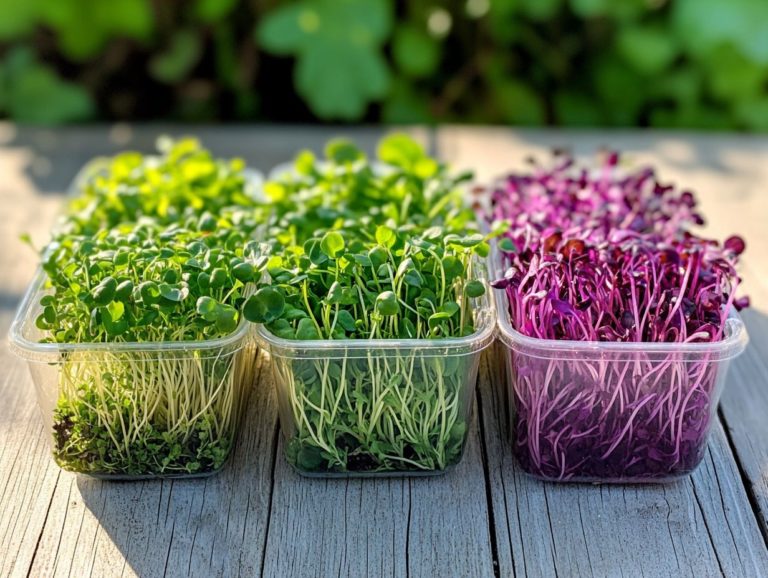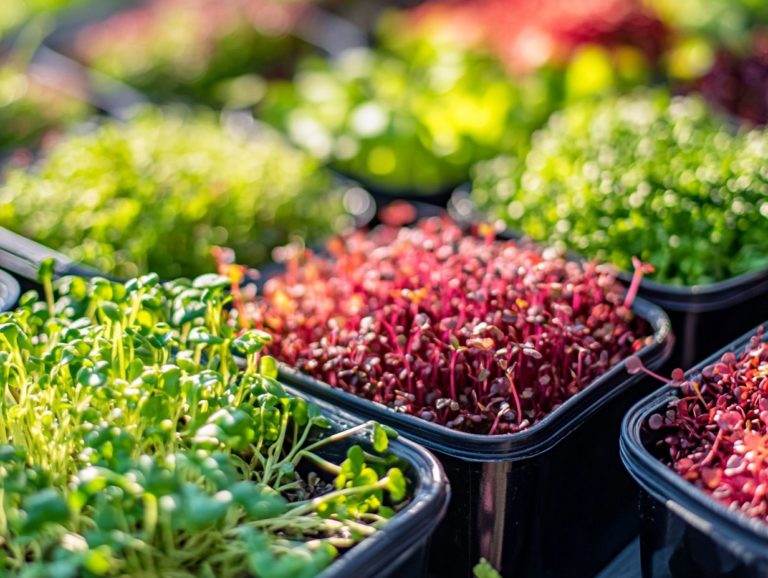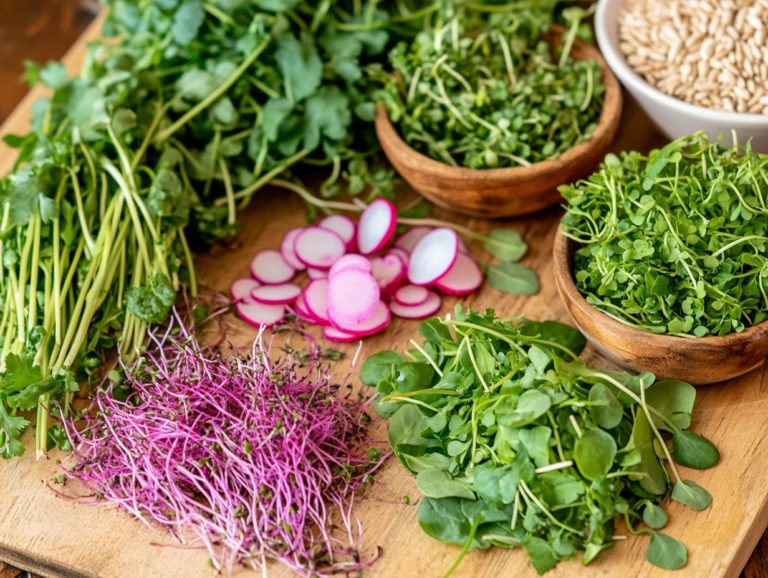5 Microgreens with Anti-Cancer Properties
Microgreens are tiny, nutrient-dense plants that deliver an impressive array of flavors and health benefits.
Get ready to explore five remarkable varieties Broccoli, Red Cabbage, Pea Shoots, Sunflower, and Watercress that are celebrated for their impressive anti-cancer properties.
Beyond their delightful taste, you’ll learn what distinguishes microgreens from sprouts, their nutritional advantages, and how you can seamlessly incorporate them into your meals.
We ll also delve into some precautions to keep in mind and highlight additional health perks that you won t want to overlook.
Dive in now to unleash the incredible potential of these little green wonders!
Contents
- Key Takeaways:
- 1. Broccoli Microgreens
- 2. Red Cabbage Microgreens
- 3. Pea Shoot Microgreens
- 4. Sunflower Microgreens
- 5. Watercress Microgreens
- What Are Microgreens and How Are They Different from Sprouts?
- Frequently Asked Questions
- What are microgreens and how do they fight cancer?
- What are the top 5 microgreens with anti-cancer properties?
- How do broccoli microgreens fight cancer?
- Which microgreens are rich in antioxidants?
- How can pea shoots microgreens prevent cancer?
- Are there any other health benefits of consuming microgreens?
Key Takeaways:
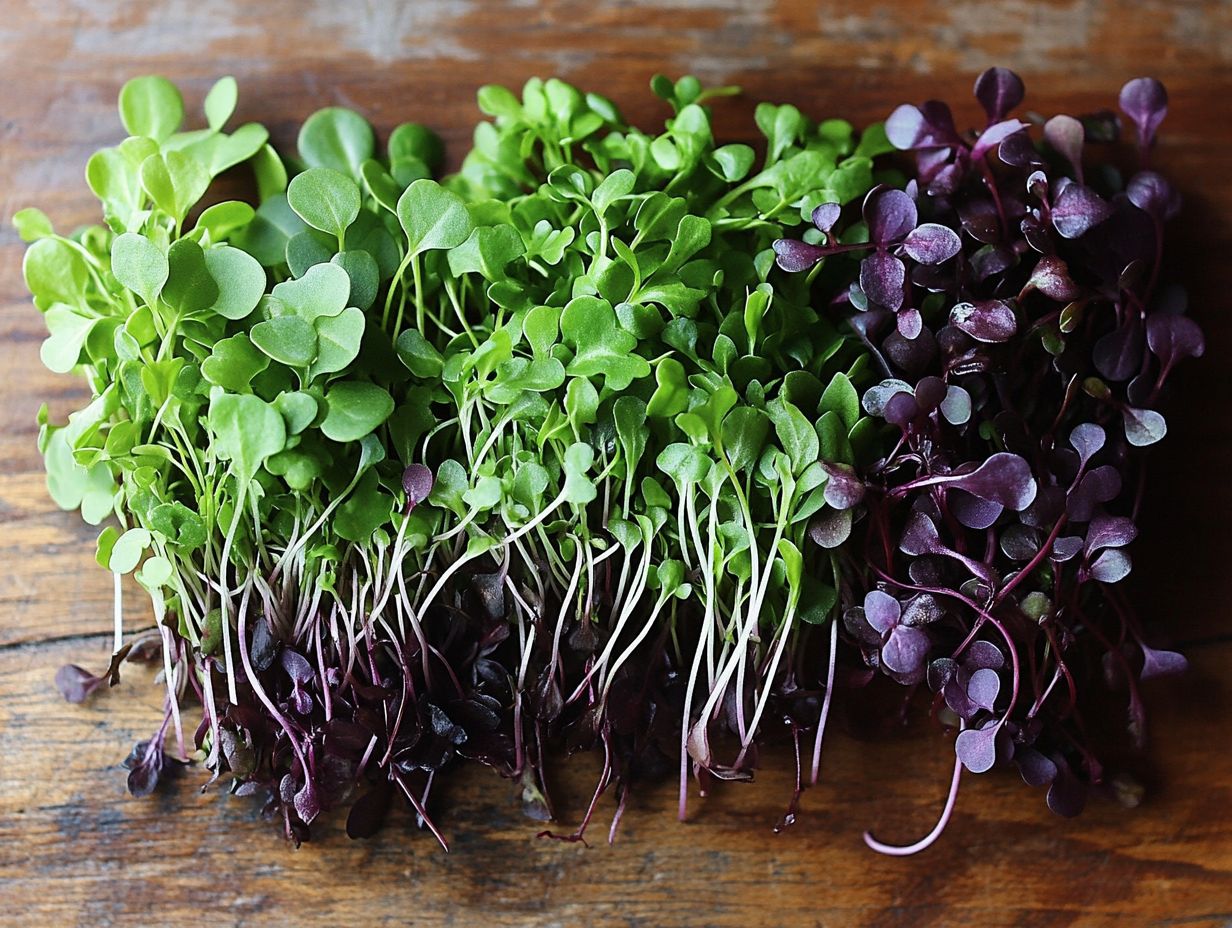
- Include microgreens in your diet to benefit from their powerful anti-cancer properties, especially broccoli, red cabbage, pea shoots, sunflower, and watercress microgreens, which are rich in plant-based nutrients and antioxidants.
- Microgreens are a great source of nutrition, making them a valuable addition to any diet.
- Add microgreens to your meals in creative ways, such as topping salads or blending them into smoothies, to reap their health benefits.
1. Broccoli Microgreens
Broccoli microgreens are a great source of nutrition, packed with vital nutrients and antioxidants. These tiny greens can elevate your balanced diet, especially if you re on the lookout for cancer-fighting additions.
Research from the Cleveland Clinic underscores the exceptional concentration of antioxidants in these microgreens, which combat oxidative stress and inflammation within your body. Incorporating nutritious microgreen varieties for smoothies, like broccoli microgreens rich in sulforaphane, may inhibit the growth of cancer cells and enhance your body’s ability to detoxify harmful compounds.
Nutrition expert Kayla Kopp highlights that these petite greens not only help in cancer prevention but also improve metabolic health. They are a smart choice for anyone looking to manage weight or enhance overall health, particularly concerning insulin resistance. To learn more about specific options, check out the microgreen varieties and their health benefits.
Incorporating broccoli microgreens into your daily meals is a simple yet powerful way to boost your nutritional intake and support your wellness journey. Why not add some to your next salad and boost your health today?
2. Red Cabbage Microgreens
Red cabbage microgreens are not just visually appealing; they are a true nutritional powerhouse. Bursting with antioxidants, vitamins, and polyphenols, they can significantly bolster your immune system and contribute to cancer prevention.
These microgreens are packed with compounds like glucosinolates, which play a vital role in neutralizing harmful free radicals and reducing inflammation—two key players in cancer development. For a boost in your smoothies, check out the top 5 microgreens for smoothies. Their vibrant hue indicates the high levels of anthocyanins present, celebrated for their protective health benefits.
Incorporating red cabbage microgreens into your salads, sandwiches, or as a garnish for soups can easily elevate both the flavor and nutritional profile of any meal. It s a simple way to boost your health with minimal effort.
3. Pea Shoot Microgreens
Pea shoot microgreens can be a delightful addition to your meals, offering substantial dietary fiber and a wealth of vitamins that enhance general health and help maintain balanced blood sugar levels.
These tiny greens are brimming with essential nutrients such as vitamins C, A, and various B vitamins, crucial for boosting your immunity and energy levels. Their high fiber content aids digestion and promotes metabolic health.
Incorporating these microgreens into your daily meals is refreshingly simple. Toss them into salads or use them as a vibrant garnish to elevate the presentation of your dishes. Their crisp texture and fresh flavor make them an excellent choice for enhancing both taste and nutritional value.
4. Sunflower Microgreens
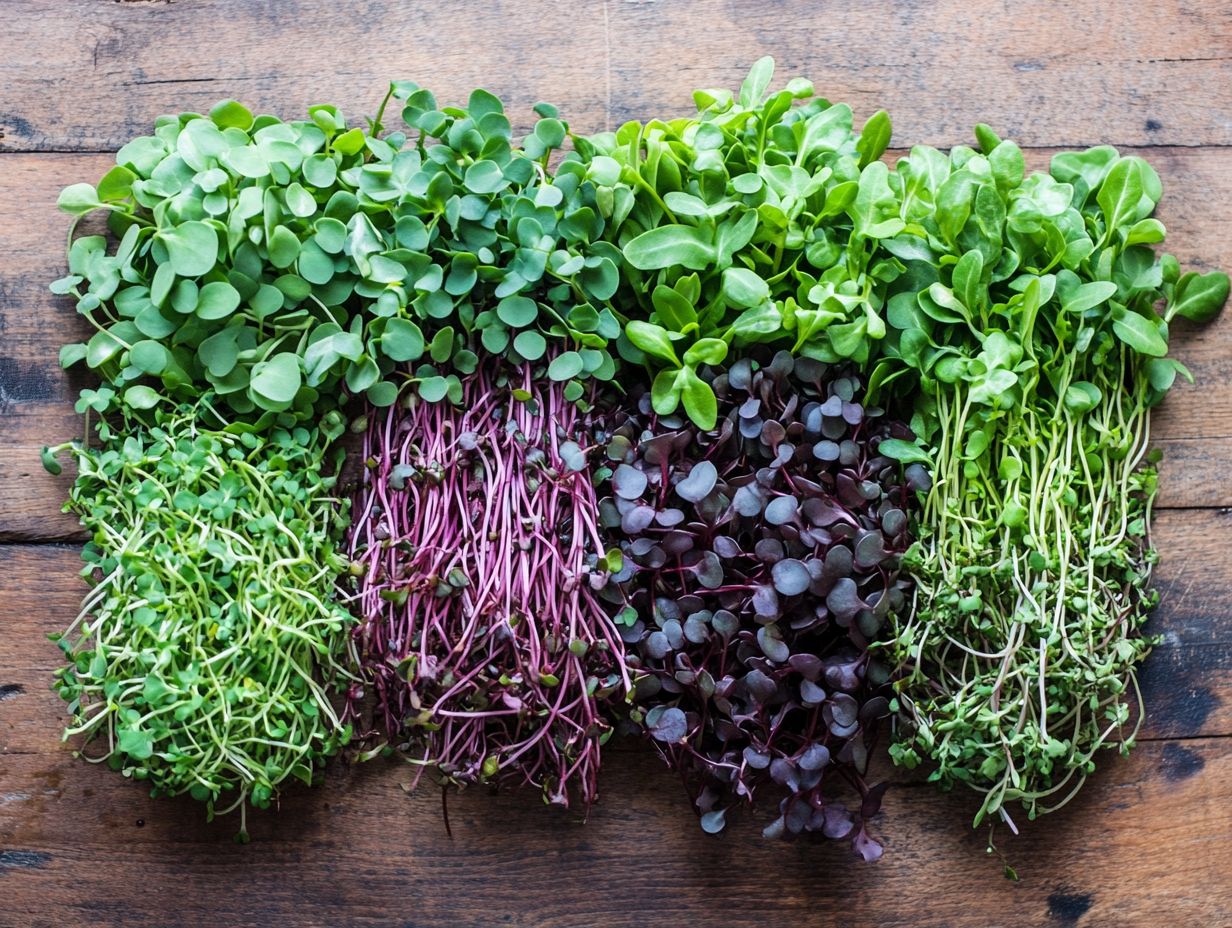
Sunflower microgreens add a delightful crunch to your meals, and they are packed with health benefits that enhance your well-being. These tiny greens are a great source of antioxidants and essential vitamins that strengthen your immune system and promote overall vitality.
Packed with vitamins A, B, C, and E, sunflower microgreens support skin health, energy production, and cellular repair. Vitamin A enhances vision and fosters immune cell growth. B vitamins boost energy metabolism, while vitamin C is crucial for collagen production, maintaining skin elasticity. Vitamin E acts as a powerful antioxidant, safeguarding your cells from oxidative stress.
Adding sunflower microgreens to your meals is super easy and incredibly tasty! You can sprinkle them into salads, blend them into smoothies, or use them as toppings for sandwiches to enjoy their remarkable health benefits.
5. Watercress Microgreens
Watercress microgreens are a true nutritional gem, offering impressive cancer-preventive properties along with a wealth of antioxidants and essential vitamins that bolster your immune system and overall health.
These petite greens are rich in vitamin C, a crucial player in collagen production and skin vitality. Their antioxidant profile helps combat oxidative stress, promoting cellular health and longevity.
To unlock their full potential, incorporate these microgreens into your salads, sandwiches, or smoothies. You can also sprinkle them on soup or fold them into omelets for a delightful flavor boost. Adding them to your meals elevates the taste and ensures a nutritious diet.
What Are Microgreens and How Are They Different from Sprouts?
Microgreens are young, edible plants harvested just after their first true leaves emerge. They differ from sprouts, which are simply germinated seeds. While both offer impressive nutritional benefits, microgreens are typically more nutrient-dense, brimming with essential vitamins, antioxidants, and health benefits, making them an exceptional choice for enriching your vegetable-rich diet.
These tiny greens come in various species, such as sunflower, radish, and basil, each bringing unique flavors and nutrients to the table. Unlike sprouts, which focus on the germination stage and offer a milder taste, microgreens deliver a concentrated burst of flavor and can be up to five times as nutrient-dense as mature vegetables. For health enthusiasts, exploring the top microgreen varieties can enhance your diet.
Incorporating different types of microgreens into your meals enhances color and texture while amplifying health benefits. For those looking to explore new tastes, consider trying unique microgreen varieties, which can potentially boost your immunity and reduce inflammation, making them a valuable addition to any healthy eating plan.
What Are the Nutritional Benefits of Microgreens?
Microgreens are celebrated for their remarkable nutritional benefits. They offer higher concentrations of vitamins, antioxidants, and dietary fiber compared to mature plants, making them an invaluable addition to any health-focused diet.
Research shows that microgreens like kale and broccoli can contain up to 40 times more essential nutrients than their fully grown versions. These petite powerhouses are rich in vitamins C, E, and K, which enhance immune function and reduce inflammation. For a deeper look at how to boost your health, explore microgreen varieties that boost your immune system and promote overall skin health.
Microgreens also have elevated antioxidant levels that help combat oxidative stress, potentially decreasing the risk of chronic diseases like heart disease and diabetes. Dietary fiber in microgreens aids digestion and helps regulate blood sugar levels, making them an excellent choice for enhancing metabolic health.
Try adding microgreens to your next meal for a health boost you won’t regret!
How Do Microgreens Help in Fighting Cancer?
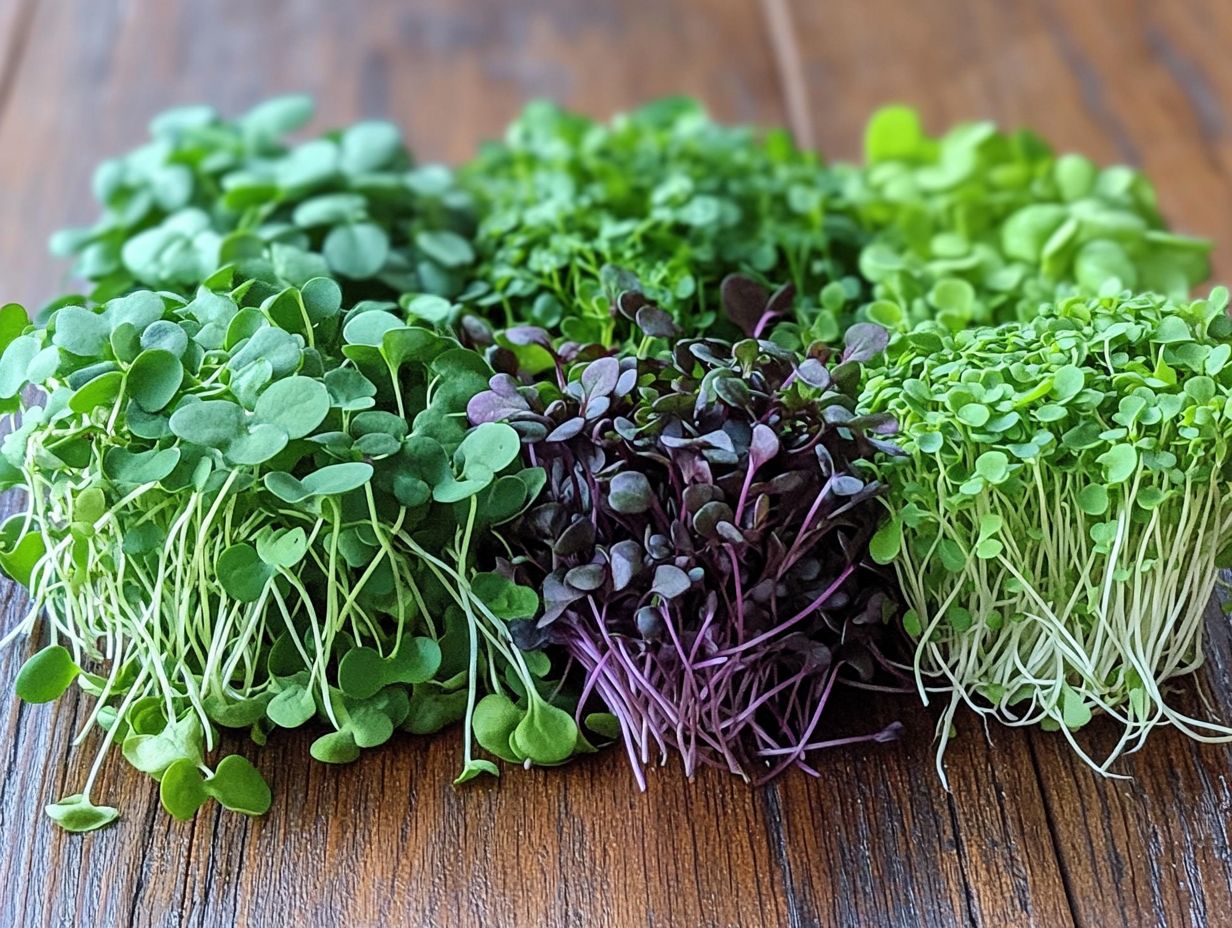
Microgreens play a vital role in cancer prevention. They contain high levels of sulforaphane, antioxidants, and polyphenols.
These compounds work together to target cancerous cells and boost your metabolic health. Research from the Cleveland Clinic highlights microgreens from the Brassicaceae family, like broccoli and kale.
These greens are rich in sulforaphane, a natural compound that helps fight cancer. It can inhibit tumor growth and detoxify harmful substances in your body.
Antioxidants in microgreens help neutralize free radicals. These unstable molecules can trigger cancer development.
Studies indicate that adding these vibrant greens to your meals may reduce inflammation. They can also enhance your body s defense against cancer at the cellular level.
This makes microgreens a vital ally in preventive eating.
What Are the Different Ways to Incorporate Microgreens into Your Diet?
Incorporating microgreens into your diet is easy and impactful. They enhance the nutritional quality of your meals.
Add them to salads, sandwiches, smoothies, or use them as garnishes. They are versatile elements that support your health.
Microgreens like peppery arugula, sweet basil, and zesty radish bring flavor and concentrated nutrients. For example, adding beet microgreens to your morning smoothie introduces earthy sweetness and boosts antioxidants.
Swap traditional lettuce in sandwiches for crunchy broccoli microgreens. This simple change adds nutty flavor and significantly boosts nutritional value.
Whether sprinkled over stir-fries or used as pizza toppings, these greens add crunch and color. They make meals visually appealing and health-enhancing.
Are There Any Precautions to Take When Consuming Microgreens?
Microgreens are usually safe and nutritious. However, it s important to take precautions to avoid health risks, especially for those with insulin resistance.
Always wash them properly and source from reputable suppliers. Understand the food safety practices tied to microgreen consumption.
These young plants can sometimes harbor harmful bacteria if mishandled. Wash microgreens thoroughly under running water to remove contaminants.
When purchasing, choose trusted vendors to ensure sanitary growing conditions. If you grow your own, maintain hygiene by using clean equipment and soil.
By practicing these safety measures, you can enjoy the many health benefits of these small but mighty greens.
What Are Some Other Health Benefits of Microgreens?
Microgreens offer a wealth of health benefits you won t want to overlook. They support metabolic health and enhance digestive health thanks to their dietary fiber.
These tiny powerhouses are loaded with essential vitamins and minerals like vitamin C, iron, and magnesium. Their antioxidants help protect your cells from damage and promote heart health.
If you re dealing with hypertension, adding these greens to your meals helps regulate blood pressure. You can easily toss them into salads or smoothies, making them a great addition to your diet.
Elevate your overall well-being in a delicious way. Microgreens are nutritious and support your health with every bite.
Frequently Asked Questions
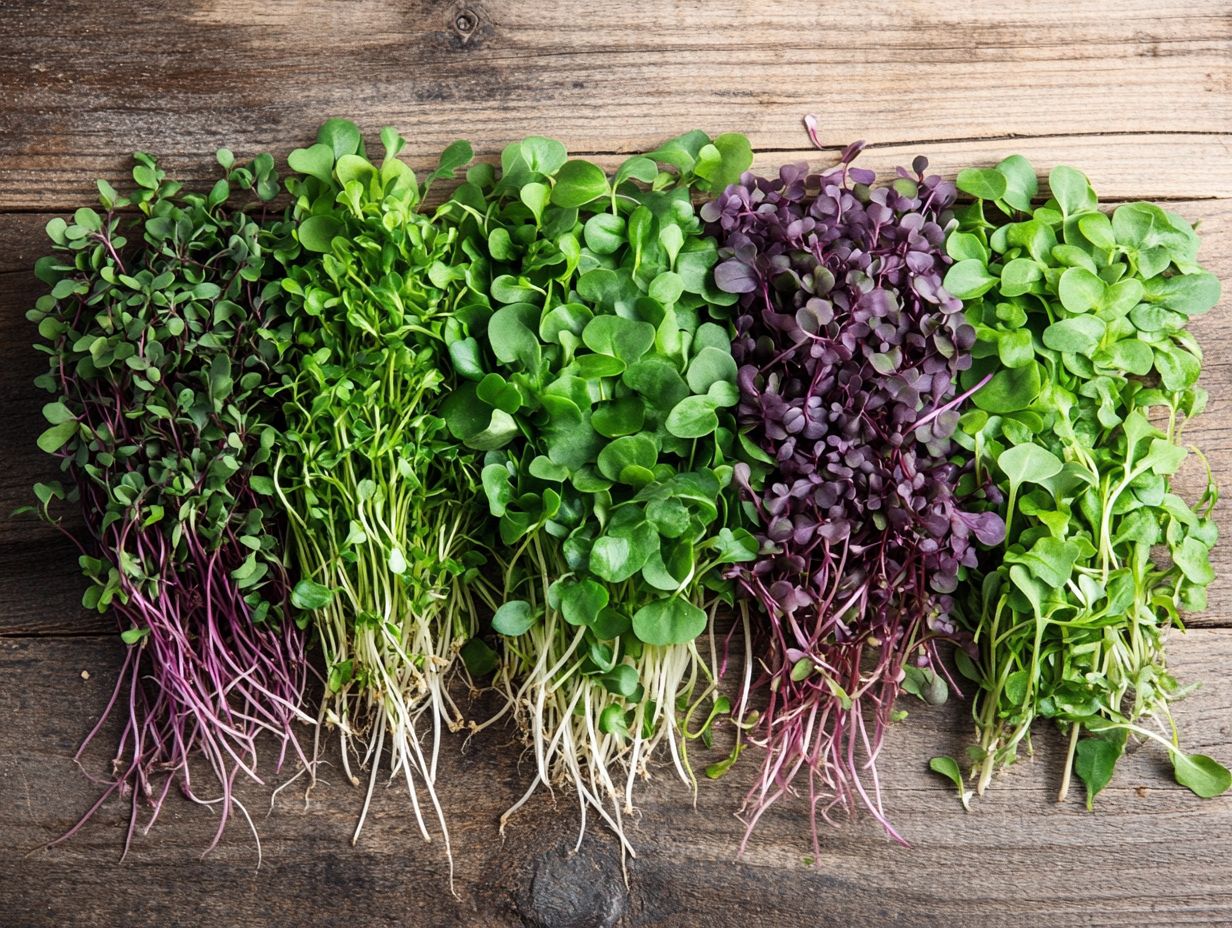
What are microgreens and how do they fight cancer?
Microgreens are young vegetable or herb seedlings harvested at an early stage, typically between 7 to 14 days after germination. They are packed with substances that help protect your cells from damage and boost your immune system.
What are the top 5 microgreens with anti-cancer properties?
- Broccoli
- Kale
- Radish
- Sunflower
- Pea shoots
These microgreens are rich in cancer-fighting compounds such as sulforaphane, glucosinolates, and beta-carotene, especially noted in broccoli sprouts.
How do broccoli microgreens fight cancer?
Broccoli microgreens contain high levels of sulforaphane, a compound that inhibits the growth of cancer cells and triggers their self-destruction. They also help detoxify the body and reduce inflammation, which are linked to cancer development.
Which microgreens are rich in antioxidants?
Kale and sunflower microgreens are rich in antioxidants such as vitamins A, C, and E, as well as beta-carotene. These antioxidants help protect your body from cell damage caused by free radicals.
How can pea shoots microgreens prevent cancer?
Pea shoots microgreens are a good source of beta-carotene, which the body converts into vitamin A. Vitamin A is essential for maintaining healthy skin, bones, and immune function, helping to prevent certain types of cancer.
Are there any other health benefits of consuming microgreens?
Yes, microgreens improve digestion, boost energy levels, and aid in weight loss. They are rich in dietary fiber, which keeps the digestive system healthy, and contain essential vitamins and minerals for overall well-being.
Start incorporating more microgreens into your diet today for enhanced health benefits!

